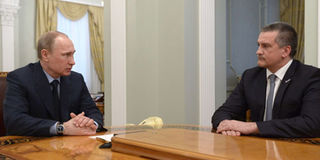Obama confronts Putin in call as crisis escalates

Russia's President Vladimir Putin speaks with Crimean prime minister Sergei Aksyonov during their meeting in Putin's Novo-Ogaryovo residence outside Moscow, on April 14, 2014. Putin is receiving many requests for help from eastern Ukraine, where pro-Moscow protesters have clashed with authorities, and is watching the situation with "great concern", his spokesman said today. AFP PHOTO / RIA-NOVOSTI / POOL/ ALEXEI NIKOLSKY
WASHINGTON, Tuesday
Presidents Barack Obama and Vladimir Putin clashed over pro-Russian separatists in Ukraine, in a tense phone call Monday as tensions between Moscow and Washington soared.
The fast escalating crisis was exacerbated by two episodes which had a dash of Cold War-style intrigue: a confrontation in the Black Sea in which a Russian warplane "buzzed" a US destroyer and a weekend visit to Kiev by CIA chief John Brennan.
The Obama administration consulted European allies and hinted that tougher sanctions targeting Russia's economy could be looming and warned Moscow was getting more and more isolated.
A White House statement said the telephone call came at Russia's request and that Obama accused Moscow of supporting "armed pro-Russian separatists who threaten to undermine and destabilise the government of Ukraine."
Senior US officials worry that the separatists, who have seized government buildings, are using a playbook familiar from the run-up to the Russian annexation of Crimea.
A Kremlin account of the call said that Putin told the president that US charges of meddling eastern Ukraine were "unfounded."
Obama told Putin that all "irregular forces in the country need to lay down their arms."
He urged Putin to "use his influence with these armed, pro-Russian groups to convince them to depart the buildings they have seized," the White House statement said.
The White House also took the rare step of confirming that Brennan had flown into Kiev over the weekend.
Russian Foreign Minister Sergei Lavrov had demanded an explanation over Brennan's visit.
Russia's Interfax news agency quoted an unidentified source as saying Brennan recommended Kiev use force against pro-Russian militants in eastern districts.
But White House spokesman Jay Carney blasted claims that Brennan's travel was anything but routine -- and said he was revealing it to rebut "false claims" made by Russia.
He said top intelligence officials had often spoken to counterparts in Russia in the post-Cold War era and that to imply Brennan's trip was any different was "absurd."
PROVOCATIVE
Carney also denied that a new Cold War was brewing between Russia and the United States, but an incident involving a Russian jet over the Black Sea and a US cruise missile destroyer did hark back to the tensions of that earlier era.
The Pentagon said the Su-24 fighter made several low-altitude, high-speed passes near the USS Donald Cook, cruising in international waters off Romania over the weekend.
"The aircraft did not respond to multiple queries and warnings from Donald Cook," said Colonel Steven Warren, a Pentagon spokesman.
"This provocative and unprofessional Russian action is inconsistent with international protocols and previous agreements on a professional interaction between our militaries."
The vessel was sent to the Black Sea in a show of Washington's solidarity with its Eastern European NATO allies concerned about Russia's incursion into Crimea.
The plane was about 1,000 meters (3,300 feet) from the American ship but did not directly traverse its decks, a military official told AFP on condition of anonymity.
The White House and the State Department signalled fresh sanctions could be coming for Russia over what Washington says are provocations in eastern Ukraine, including the seizure of administrative and police buildings by Moscow-backed armed groups.
In a new sign of US pressure on European allies, Obama spoke to French President Francois Hollande by telephone.
Hollande spoke of France's "determination to put in place, with its European partners, a policy of firm, progressive sanctions," his office said.
In a call with German Chancellor Angela Merkel on Friday, Obama had warned that the EU and the United States should be prepared to meet further Russian escalations with tougher sanctions.
Washington and the EU have already imposed sanctions on key individuals in Crimea and officials around Putin and several Kremlin-linked firms.
Western nations have warned they could go after the Russian economy, including in the mining, finance and energy sectors, if Moscow does not change course.
But since such a move could also harm fragile European economies, they remain a political heavy lift for many of the continent's leaders.
The EU agreed to extend a list of asset freezes and visa bans on top Russian officials, but held off on tougher measures until after a meeting of key officials from the EU, United States, Ukraine and Russia in Geneva on Thursday.
The State Department defended the meeting, amid complaints by some administration critics in Washington that it was irrelevant to fast-escalating events.
"We feel there should always be an opportunity and an opening for diplomacy," said spokeswoman Jennifer Psaki.
Washington also formally signed a $1 billion loan guarantee for Kiev, passed by Congress earlier this month.





